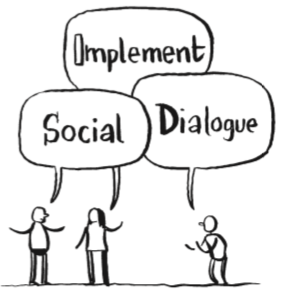Social Dialogue key to Covid Recovery

At a national level, a new structure for Social Dialogue is required where issues may be discussed in a deliberative manner. Any proposal for Social Dialogue should involve Government, trade unions and employers, the community and voluntary sector, as well as farmers and environmental groups. Any structure for Social Dialogue that excludes any of these groups would be a recipe for ensuring that inequality would grow as most of Ireland’s resources would be captured by those participating in these discussions. Such an approach would simply lead to deepening divisions in Ireland.
Government needs to engage all sectors of society, not just trade unions and employers, in addressing the huge challenges Ireland currently faces in the areas of infrastructure and services, climate and regional development, taxation and unemployment, etc.
If government wishes all sectors of society to share responsibility for producing a more viable future, then it must involve all sectors of society in a real manner in planning for it. Responsibility for shaping the future should be shared among all stakeholders. There are many reasons for involving all sectors in this process, including:
- to ensure priority is given to well-being and the common good;
- to address the challenges of markets and their failures; and
- to link rights and responsibilities.
The design and implementation of our recovery after the COVID-19 crisis will reshape our society and economy for the longer-term and indeed for future generations. It is important that we get these decisions right. Ireland’s economic growth has been spread very unevenly; we must ensure that this trend does not continue.
Furthermore, there are a range of key issues that go beyond the economy. These include:
- infrastructure (e.g., social housing, public transport, rural broadband);
- services (e.g., healthcare, education, caring);
- climate change and sustainability generally;
- just taxation;
- good governance; and
- wellbeing.
These are all issues that impact on the economy and are impacted on by the economy but are not confined to the economy. Ireland needs an approach that addresses these issues simultaneously, not one that gives priority to the economy and hopes the benefits will trickle down, which they never do.
In our latest policy brief on a Social Dialogue, we set out 10 important features of a Social Dialogue Model. In the absence of a real Social Dialogue at national level, the strongest can fight their corner in the open market or in the political realm, while the weakest will be left behind. In such a scenario inequality, already at unacceptable levels, will continue to grow and the integrated development that is required will not be achieved.
When groups have been involved in shaping decisions, they are far more likely to take responsibility for implementing these decisions, difficult as they may be. A process of Social Dialogue involving all and not just some of the sectors in Irish society would be a key mechanism in maximising the resources for moving forward.